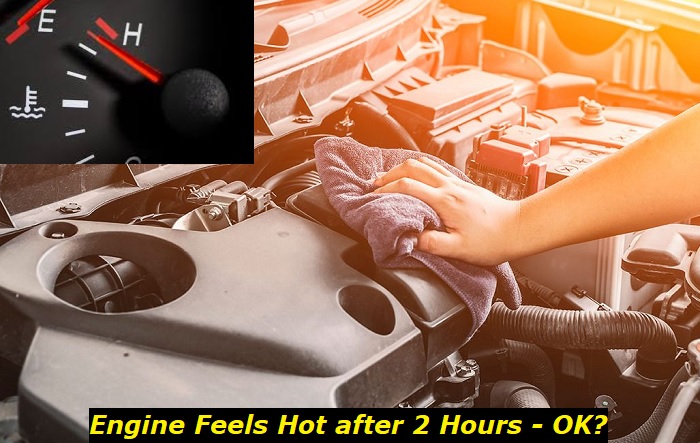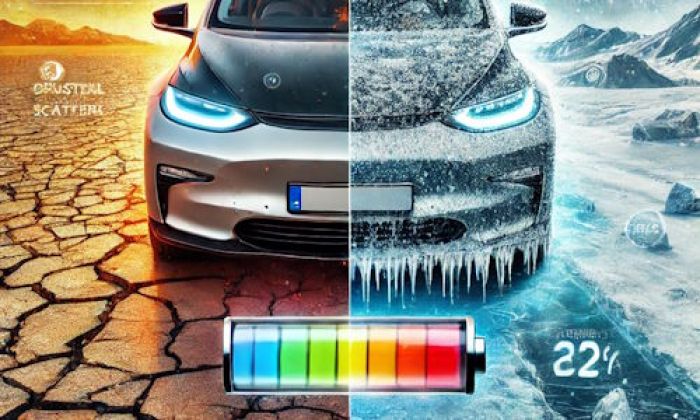If the engine in your vehicle is still hot after it has been off for two hours, it most likely was overheated badly. This is a very serious issue that can immediately kill the engine if it keeps working or at least shorten its lifespan!
Engine overheating highlights
- Level of urgency:very high
- Commonreasons:low coolant, thermostat problems, coolant blockage, radiator fan problem
- DIY diagnostics:possible but complicated
- DIY repair:impossible
- Price of repair:$300 - $650
- Time for repair:3 - 6 hours
- If ignored:engine failure, low performance, cooling equipment damage

How Long Does a Car Take to Cool Down After Driving?
In good condition, it typically takes 30-40 minutes for a car to cool down to a safe temperature to inspect and work on after the engine is stopped. However, various factors may affect the rate of cooling.
1) Engine size
One is the size of the engine. Smaller engines tend to cool faster than their larger counterparts due to smaller surface areas.
2) Outside temperature
Another factor is the weather. If the environmental temperature around your area is cold or freezing, it'll take a shorter period of around 15-20 minutes for the overheated engine to cool down. That's another case for a car in a hot area or a car hood under a scorching sun, which can take up to one hour or even more before the engine cools to a suitable temperature.
3) Engine bay insulation
The level of engine insulation also affects the cooling rate of the engine. A highly insulated engine traps more heat; therefore, heat loss takes longer, which means the cooling rate will be slow.
4) Engine block type
The engine block's material is another factor affecting the overheated engine's cooling rate. Aluminum engine blocks take less time to cool, while steel and cast iron take longer.
5) The initial temperature of the engine
What was the temperature of the engine when you stopped the car? If it was extremely hot, it will take longer for the vehicle to cool down completely.
While some cars will throw a message, something like "High Engine Temperature, Stop Safely" in Ford cars, other vehicles will calmly observe the engine dying.
So, why is my engine still hot after 2 hours of being off?
Sadly enough, you may be sure that the engine is overheating. If the temperature is normal, the engine will cool down completely in about an hour even if you are in Florida in the summer. If it takes much more than that, I should say the engine is overheating.
Here are the reasons why this may happen:
1) Low Coolant Level
Coolant plays a big part in regulating the engine temperature, so when it isn't enough, it causes the engine to overheat. A coolant leakage within the cooling system causes the level of the coolant to decrease. The coolant can leak from the gasket, thermostat, hose, sensor, etc.
Check the coolant level and the condition of the liquid. It should be clean and stay between the MAX and MIN levels in the coolant reservoir.
2) A Broken Water Pump
A broken water pump will prevent the cooling system from working effectively, causing the engine to overheat. This is because a broken water pump won't be able to circulate the coolant around the engine parts and back to the radiator.
This will lead to inevitable overheating and if you don't notice the fuel gauge readings, the engine will immediately die.
3) A Stuck Thermostat
A thermostat can get stuck in a closed or open position. When it gets stuck in a closed position, the coolant continues to bypass the radiator; hence, it cannot release the heat it carries from the engine block into the radiator. This leads to the engine overheating.
This will cause overheating almost as bad as in the case of the broken pump. Again, the temperature gauge readings should help you notice that on time.
4) A Clogged Radiator
A clogged radiator may also be another reason the car is overheating. It prevents the coolant from cooling by the cooling fans and metal fins in the radiator. The clogging may be internal (blocking the flow of the coolant) or external (very dirty radiator).
5) Cooling Fan Failure
The radiator fan cools the engine by spinning the blades, which generate airflow. If the radiator fan becomes faulty, the blades cannot spin; hence the engine temperature can increase when you drive in traffic jams or just slow traffic. If the gauge shows a high temperature and the cooling fan isn't working, you should check the fan itself.
What can you do to avoid issues?
First of all, you need to understand that the temperature gauge on the dash is not the 100% correct thing. It may lie to you or show random readings. So, if you suspect that the engine is overheating, never believe exclusively the gauge.
Drive your car with intermittent stops and let it cool down. This will help your engine avoid any serious damage from overheating. When the engine is cold, you can safely drive it for several minutes even if the water pump isn't functioning. But be careful - these cases are extreme and need professional help immediately.
Try to locate the problem. Using the list of possible overheating reasons that I presented you with in this article, try to locate the actual issue that makes your engine overheat. Maybe, this is something easy to fix and you can solve the problem on your own.
Check the level and the condition of the coolant. Locate the antifreeze reservoir under the hood. Make sure that the level is OK. After that, open the cap (make sure the engine is not hot!) and look at the coolant. It shouldn't have any oily film on it and the color should be bright and clear.
Try driving when the engine is cold. While driving, keep an eye on the temperature gauge. Does it reach the normal temperature fast? Does it stop where it should stop?
Why can't you always rely on the temperature gauge?
The engine coolant temperature gauge is not a very reliable source of information. This gauge is connected to the special sensor that measures the temperature of the engine coolant somewhere in the engine.
There are numerous cases when it may show wrong readings or not show anything at all:
- the wire is broken;
- the sensor isn't functioning properly;
- the gauge is stuck;
- the dash is broken;
- the coolant is too low.
The sensor measures the temperature of the coolant. So, it's submerged into the coolant somewhere in the engine. But what if there is no coolant in the system or the level is lower than the location of the sensor?
Well, in this case, you will not see any reading or the readings will be wrong. So, you just can't completely rely on this sensor and keep driving carelessly just because it shows normal engine temperature.
I've seen a guy saying that he felt the engine heat inside the car and kept driving because the gauge was OK. It turned out that the gauge was stuck and the engine was eventually blown.
Should you worry if the engine is hot for 2 hours?
In short, yes, you should worry and you should find the reason why this happens. I can imagine that in a very hot climate and in a well-insulated car the engine may keep the high temperature for 2 hours. But in the majority of cases, we are talking about overheating.
Check the vehicle on your own. If you can't find the reason for the problem, make sure you get professional help! Also, share your experience in the comments below.
About the authors
The CarAraC research team is composed of seasoned auto mechanics and automotive industry professionals, including individuals with advanced degrees and certifications in their field. Our team members boast prestigious credentials, reflecting their extensive knowledge and skills. These qualifications include: IMI: Institute of the Motor Industry, ASE-Certified Master Automobile Technicians; Coventry University, Graduate of MA in Automotive Journalism; Politecnico di Torino, Italy, MS Automotive Engineering; Ss. Cyril and Methodius University in Skopje, Mechanical University in Skopje; TOC Automotive College; DHA Suffa University, Department of Mechanical Engineering






Add comment